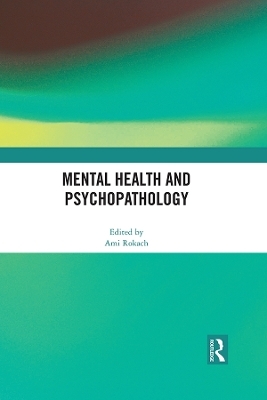
Mental Health and Psychopathology
Routledge (Verlag)
978-1-032-15318-6 (ISBN)
For one to be categorized as exhibiting positive mental health, an individual should not experience psychopathology, and additionally exhibit high levels of emotional well-being as well as high levels of psychological and social functioning. The dual-factor model of mental health suggests that enhancing positive mental health and alleviating psychopathology do not automatically go together and are not opposite of one another. There is accumulating evidence that psychopathology and positive mental health function along two different continua that are only moderately interrelated. However, to know what wellbeing is, understand good mental health, and enhance adaptive functioning, we need to explore and understand psychopathology, and how it affects us. The volume is divided into three conceptual sections: The Experience of Psychopathology, which is devoted to describing what it is and how it is experienced; The Effect of Psychopathology on Everyday Life, describes various effects that psychopathology has on the daily life of the sufferer; Coherence, Resilience and Recovery, which focuses on dealing with it, coping with the symptoms, and developing resilience.
The chapters in this book were originally published in The Journal of Psychology.
Ami Rokach is clinical psychologist who has been researching and teaching about loneliness, human sexuality, and psychotherapy for the past 40 years. Ami is Executive Editor of The Journal of Psychology: Interdisciplinary and Applied, and a clinical psychologist who combines offering individual, couple and sex therapy with teaching and research. He is member of the psychology departments at York University in Canada, and Walden University in the USA.
Part 1: The Experience of Psychopathology 1. Fifty Shades of Darkness: A Socio-Cognitive Information-Processing Framework Applied to Narcissism and Psychopathy 2. Self-Stigma Is Associated with Depression and Anxiety in a Collectivistic Context: The Adaptive Cultural Function of Self-Criticism 3. Language and the Symptoms of Mental Illness Connection via Abstract Representations of the Self and the World 4. Personality Trait Interactions in Risk for and Protection against Social Anxiety Symptoms 5. Insecure Attachment and Subclinical Depression, Anxiety, and Stress: A Three-Dimensional Model of Personality Self-Regulation as a Mediator 6. Self-Criticism, Neediness, and Distress in the Prediction of Suicide Ideation: Results from Cross-Sectional and Longitudinal Studies 7. Obsessive-Compulsive and Depressive Symptoms: The Role of Depressive Cognitive Styles 8. Faces of Shame: Implications for Self-Esteem, Emotion Regulation, Aggression, and Well-Being 9. Cognitive Alexithymia Mediates the Association Between Avoidant Attachment and Interpersonal Problems in Patients With Somatoform Disorder 10. Impact of Economic Hardship and Financial Threat on Suicide Ideation and Confusion Part 2: The Effect of Psychopathology on Everyday Life 11. The Role of Vulnerable and Grandiose Narcissism in Psychological Perpetrated Abuse Within Couple Relationships: The Mediating Role of Romantic Jealousy 12. Personality Change in Middle Adulthood: With Focus on Differential Susceptibility 13. Effect of Depressive Symptoms and Sex on the Relationship Between Loneliness and Cigarette Dependence: A Moderated Mediation 14. Body Dysmorphic Symptoms, Functional Impairment, and Depression: The Role of Appearance-Based Teasing Part 3: Coherence, Resilience and Recovery 15. Resilience and Coping as Predictors of Well-Being in Adults 16. Loneliness and Suicidal Risk in Young Adults: Does Believing in a Changeable Future Help Minimize Suicidal Risk Among the Lonely? 17. Loneliness and Negative Affective Conditions in Adults: Is There Any Room for Hope in Predicting Anxiety and Depressive Symptoms? 18. Related Changes in Personal Recovery, Benefit Finding, and Sense of Coherence among People with Chronic Mental Illness: A Two-Wave Study
| Erscheinungsdatum | 31.01.2024 |
|---|---|
| Verlagsort | London |
| Sprache | englisch |
| Maße | 174 x 246 mm |
| Gewicht | 453 g |
| Themenwelt | Geisteswissenschaften ► Psychologie ► Klinische Psychologie |
| Medizin / Pharmazie ► Medizinische Fachgebiete ► Psychiatrie / Psychotherapie | |
| Medizin / Pharmazie ► Medizinische Fachgebiete ► Suchtkrankheiten | |
| ISBN-10 | 1-032-15318-0 / 1032153180 |
| ISBN-13 | 978-1-032-15318-6 / 9781032153186 |
| Zustand | Neuware |
| Informationen gemäß Produktsicherheitsverordnung (GPSR) | |
| Haben Sie eine Frage zum Produkt? |
aus dem Bereich


